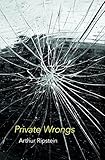Private Wrongs / Arthur Ripstein.
Material type: TextPublisher: Cambridge, MA : Harvard University Press, [2016]Copyright date: ©2016Description: 1 online resource (328 p.)Content type:
TextPublisher: Cambridge, MA : Harvard University Press, [2016]Copyright date: ©2016Description: 1 online resource (328 p.)Content type: - 9780674969896
- 346.03 23
- K923 .R57 2016eb
- online - DeGruyter
| Item type | Current library | Call number | URL | Status | Notes | Barcode | |
|---|---|---|---|---|---|---|---|
 eBook
eBook
|
Biblioteca "Angelicum" Pont. Univ. S.Tommaso d'Aquino Nuvola online | online - DeGruyter (Browse shelf(Opens below)) | Online access | Not for loan (Accesso limitato) | Accesso per gli utenti autorizzati / Access for authorized users | (dgr)9780674969896 |
Frontmatter -- Contents -- Preface -- 1. Introduction -- 2. What You Already Have, Part 1 -- 3. Using What You Have -- 4. Wrongdoing for Which the Offender Must Pay -- 5. Use What Is Yours in a Way That Does Not Injure Your Neighbor -- 6. A Malicious Wrong in Its Strict Legal Sense -- 7. What You Already Have, Part 2 -- 8. Remedies, Part 1 -- 9. Remedies, Part 2 -- 10. Conclusion -- Index
restricted access online access with authorization star
http://purl.org/coar/access_right/c_16ec
Tort law recognizes the many ways one person wrongs another. Arthur Ripstein brings coherence to torts’ diversity in a philosophically grounded, analytically powerful theory. He shows that all torts violate the basic moral idea that each person is in charge of his or her own person and property, and never in charge of another’s person or property.
Mode of access: Internet via World Wide Web.
In English.
Description based on online resource; title from PDF title page (publisher's Web site, viewed 01. Dez 2022)


